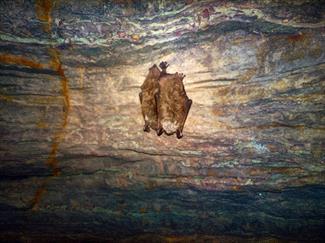Bats in cave

In people, the disease is sometimes referred to as Cave disease because people get infected after hiking in caves that contain high amounts of bat droppings. Photo by Depositphotos
Histoplasmosis is a fungal infection of animals and people, caused by Histoplasma capsulatum. The fungus lives in the environment, growing best in warm, moist organic matter that is rich in nitrogen. Common sources include bird and bat feces left on the ground. In people, the disease is sometimes referred to as Cave disease because people get infected after hiking in caves that contain high amounts of bat droppings.
In the U.S., most infections are reported around the Ohio, Mississippi, and Missouri River valleys.
Getting Infected
Animals and people become infected after breathing in the fungus. Cats tend to be more vulnerable to infection than dogs. Once the Histoplasma fungi are inhaled, they primarily reproduce in the lungs, then spread to other organs, such as the eyes, gastrointestinal (GI) tract, skin, lymph nodes, liver, spleen, and bone marrow. Occasionally, the bones, joints, and nervous system are affected too. In some situations, Histoplasma will reproduce in the GI tract of dogs, with or without the lungs being involved.
Cats’ and dogs’ immune systems fight the Histoplasma fungi once they arrive in the body. Healthy animals may be able to fight the infection well enough to avoid any signs or symptoms, eventually ridding themselves of histoplasmosis completely. Animals with a weak immune system may have a harder time controlling Histoplasma, sometimes developing severe, life-threatening disease that is difficult to cure. Even animals that are treated successfully can relapse, resulting in a recurrence of their clinical signs and symptoms.
Histoplasmosis Signs and Symptoms
Clinical signs and symptoms often include poor appetite, fever, losing weight, and/or acting tired. In dogs, GI symptoms are common, especially diarrhea or loose stool and straining to defecate or poop. Trouble breathing, breathing rapidly, coughing, and a runny nose may be seen in cats and dogs when the lungs are affected. Blindness or trouble seeing, squinting, and swollen eyes (conjunctivitis) are common signs when the eyes are involved. Other signs and symptoms will be related to the organ systems that the disease spreads to, such as pale gums, yellow tinge to the skin and eyes (icterus), skin ulcers or wounds that ooze, swellings below the skin (that could be enlarged lymph nodes or draining tracts of infection).
Diagnosis starts with a thorough physical examination by the veterinarian, who will note the physical and clinical issues and try to determine which organs are affected. Lab work will be performed, such as a serum biochemistry test and a complete blood count (CBC), to gauge internal organ health and determine how the immune system is handling the disease. Common findings on a biochemistry test include hypoalbuminemia, or low levels of a type of protein called albumin, which can occur when the GI tract or liver is badly affected. CBC findings include anemia, a condition is caused by low levels of red blood cells in the blood, and thrombocytopenia, which is low levels of platelets in the blood. Both conditions can potentially cause pale gums and a decreased activity level.
Tests that confirm histoplasmosis include cytology or histopathology to view the fungal organism in tissues and/or fluids. Antigen and/or antibody blood tests are also commonly performed, which confirm the infection based on the body’s immune responses. Other tests that may be needed are X-rays to assess damage to the lungs and an ultrasound to view damage to internal organs in the belly.
Treatment
Treating Histoplasma infections is costly and time-consuming. Many pets need to be treated for more than 6 months. Common medications used are antifungals, usually itraconazole, fluconazole, or amphotericin B. These medications can sometimes case unfortunate side effects such as vomiting, poor appetite, loose stool/diarrhea, or kidney problems. The pet will need to have frequent check ups and blood tests to make certain the medication is working and side effects are not problematic.
Symptomatic treatment, meaning treatment for the individual clinical signs and symptoms, include IV fluids for dehydration, antibiotics if secondary bacterial infections occur, and oxygen therapy and other treatments for difficulty when breathing. Seriously sick pets that have poor appetites may also need help with eating, such as a feeding tube.
After finishing treatment, check-ups and blood tests will need to be repeated periodically to make sure the infection is still gone and that the pet is not going to relapse. If relapse occurs and symptoms return, the pet will need to start antifungal medications again.
Prognosis
Histoplasmosis is a dangerous disease. Pets that get infected but don’t show symptoms will likely be able to rid themselves of infection on their own. However, most sick, symptomatic pets will die if not treated. Many sick pets that undergo treatment have a fair chance of improving, depending on which organs are involved. For example, cats and dogs with only lung involvement generally improve with treatment, whereas those with other organ involvement may not survive treatment. If a pet with severe disease or multiple organs involved does survive, they may only survive for a few months to a few years.